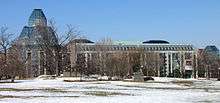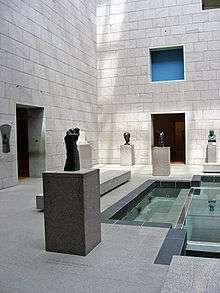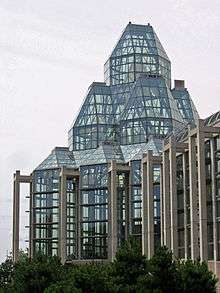National Gallery of Canada
 | |
| Established | 1880 (building 1988) |
|---|---|
| Location |
380 Sussex Drive Ottawa, Ontario, Canada K1N 9N4 |
| Coordinates | 45°25′46″N 75°41′54″W / 45.429434°N 75.698386°WCoordinates: 45°25′46″N 75°41′54″W / 45.429434°N 75.698386°W |
| Type | art galleries |
| Director | Marc Mayer |
| Curator | Paul Lang |
| Website | www.gallery.ca/ |
The National Gallery of Canada (French: Musée des beaux-arts du Canada), located in the capital city of Ottawa, Ontario, is one of Canada's premier art galleries.[1]
The Gallery is now housed in a glass and granite building on Sussex Drive with a notable view of the Canadian Parliament buildings on Parliament Hill. The building was designed by Moshe Safdie and opened in 1988.[2] The Gallery's former director Jean Sutherland Boggs was chosen especially by Prime Minister Pierre Trudeau to oversee construction of the national gallery and museums.[3]
Marc Mayer was named the museum's director, succeeding Pierre Théberge, on 19 January 2009.[4]
History

The Gallery was first formed in 1880 by Canada's Governor General John Douglas Sutherland Campbell, 9th Duke of Argyll, and, in 1882, moved into its first home on Parliament Hill in the same building as the Supreme Court.[2] In 1911, the Gallery moved to the Victoria Memorial Museum, now the home of the Canadian Museum of Nature. In 1913, the first National Gallery Act was passed outlining the Gallery's mandate and resources.[2] In 1962, the Gallery moved to the Lorne Building site, a rather nondescript office building on Elgin Street.[5] Adjacent to the British High Commission, the building has since been demolished for a 17 storey office building that is to house the Federal Finance Department. The museum moved into its current building on Sussex Drive in 1988, beside Nepean Point.
In 1985, the newly created Canadian Museum of Contemporary Photography (CMCP), formerly the Stills Photography Division of the National Film Board of Canada, was affiliated to the National Gallery. The CMCP's mandate, collection and staff moved to its new location in 1992, at 1 Rideau Canal, next to the Château Laurier. In 1998, the CMCP's administration was amalgamated to that of the National Gallery's.
In 2000, the Royal Architectural Institute of Canada chose the National Gallery as one of the top 500 buildings produced in Canada during the last millennium.[6]
Directors
- Eric Brown 1912-1939
- Harry Orr McCurry 1939-1955
- Alan Jarvis 1955-1959
- Charles Fraser Comfort 1960-65
- Jean Sutherland Boggs 1966-1976
- Hsio-Yen Shih 1976-1981
- Joseph Martin 1981-1987
- Shirley Thomson 1987-1997
- Pierre Théberge 1998-2008
- Marc Mayer 2009-
Collection

The Gallery has a large and varied collection of paintings, drawings, sculpture and photographs. Although its focus is on Canadian art, it holds works by many noted American and European artists. It has a strong contemporary art collection with some of Andy Warhol's most famous works.[7] In 1990 the Gallery bought Barnett Newman's Voice of Fire for $1.8 million, igniting a storm of controversy. Since that time its value has appreciated sharply. In 2005, the Gallery acquired a painting by Italian Renaissance painter Francesco Salviati for $4.5 million.[8] Its most famous painting is likely The Death of General Wolfe by Anglo-American artist Benjamin West.
In 2005, a sculpture of a giant spider, Louise Bourgeois's Maman, was installed in the plaza in front of the Gallery.[9] In 2011 the gallery installed Canadian sculptor Joe Fafard's Running Horses next to the Sussex Drive entrance, and American artist Roxy Paine's stainless steel sculpture One Hundred Foot Line in Nepean Point behind the gallery.
The Canadian collection, the most comprehensive in Canada, holds works by Louis-Philippe Hébert, Tom Thomson, the Group of Seven, Emily Carr, Alex Colville, Jean-Paul Riopelle and Jack Bush.[10]
The Gallery organizes its own exhibits which travel across Canada and beyond, and hosts shows from around the world, often co-sponsored with other national art galleries and museums.[11][12]
The Gallery's collection has been built up through purchase and donations. Much of the collection was donated, notably the British paintings donated by former Governor General Vincent Massey and that of the Southam family.
Noted works alphabetical by artist


The museum features Canadian, Native and Inuit art, American and European painting, sculpture, prints and drawings, modern and contemporary art and photographs. The largest work in the Gallery is the entire interior of the Rideau Street Chapel, which formed part of the Convent of Our Lady Sacred Heart,[5] The interior decorations of the Rideau Street Chapel were designed by Georges Couillon in 1887. After the convent was demolished in 1972, the chapel was dismantled, stored and reconstructed within the gallery as a work of art in 1988.
- Francis Bacon: Study for Portrait No. 1 (1956)
- Hans Baldung: Eve, the Serpent and Death (1515)
- Pompeo Batoni: Vulcan at his forge (1750).
- Carl Beam: The North American Iceberg (1985)
- Gian Lorenzo Bernini: Bust of Pope Urban VIII (1637)
- Louise Bourgeois: Maman (1999)
- Georges Braque: The Port of Antwerp (1906)
- Bronzino: Pierantonio Bandini (c1550-1555)
- Sheila Butler: Figure in a Tent (1983);[13] An Inner Door (1984);[14] The Ganges in New Jersey (1984)[15]
- Canaletto: St Mark's and the Clock Tower Venice (1737); The Campo di Rialto and San Giacomo di Rialto Venice (1760)
- Antonio Canova: Dancer (c1818-22, marble)[16]
- Janet Cardiff: Forty-Part Motet (2001)[17]
- Paul Cézanne: Forest (c1902-04); Meadow and Farm of Jas de Bouffan
- Marc Chagall: Memories of My Youth (1924)
- Alex Colville: To Prince Edward Island (1965)
- John Constable: Salisbury Cathedral from the Bishop's Grounds (1820)
- Piero di Cosimo: Vulcan and Aeolus (1495)
- Lucas Cranach the Elder: Venus (1528)
- Salvador Dalí: Gala and The Angelus of Millet Before the Imminent Arrival of the Conical Anamorphoses (1933)
- Honoré Daumier: Le Wagon de troisième classe (1865)
- Robert Field: Sir Alexander Croke (c.1808)
- Gustav Klimt: Hope I (1903)
- Max Klinger: Friedrich Nietzsche (bronze, c1904).
- Thomas Lawrence: Thomas Taylor (1817)
- Fernand Léger: The Mechanic (1920)
- René Magritte: Perspective: Madame Récamier by David, parodying the Portrait of Madame Récamier (1951)
- Simone Martini: Saint Catherine of Alexandria (c1320-25).
- Henri Matisse: Nude on a Yellow Sofa (1926)
- Piet Mondrian: Composition No. 12 with Blue (1942)
- Claude Monet: Jean-Pierre Hoschedé et Michel Monet au bord de l'Epte (1890); Waterloo Bridge: the Sun in a Fog (1903)
- Ron Mueck: Untitled (Old Woman in Bed) (2000); Head of a Baby (2003); A Girl (2006-2007).
- Barnett Newman: Voice of Fire (1967)
- Roxy Paine: One Hundred Foot Line[18]
- Pablo Picasso: The Small Table (1919)
- Camille Pissarro: Hay Harvest at Éragny (1901)
- Jackson Pollock: No. 29, 1950
- Rembrandt Van Rijn: A Woman at her Toilet (1633); The Tribute Money (1629)
- Auguste Rodin: The Age of Bronze (1876)
- Peter Paul Rubens after Caravaggio: Entombment of Christ (1614)
- Leesa Streifler: Contemporary Mythology: Compassion (1989)
- Tom Thomson: Jack Pine (1917)
- Vincent van Gogh: Iris (1889); Still-life: Flowers (1886)
- Edward Wadsworth: Dazzle-ships in Drydock at Liverpool[19][20]
- Andy Warhol: Brillo (1964); Ten variations on Mao Tse-tung (1972)
- Benjamin West: The Death of General Wolfe (1770)
Affiliations
The Museum is affiliated with: CMA, Ontario Association of Art Galleries, CHIN, and Virtual Museum of Canada.
References
- ↑ The Canadian Encyclopedia
- 1 2 3 National Gallery of Canada - 1980
- ↑ "Concordia university to award five honorary degrees at five ceremonies for 3300 graduating students". Concordia University.
- ↑ "Mayer confirmed as gallery director", The Globe and Mail, 8 December 2008.
- 1 2 Pound, Richard W. (2005). 'Fitzhenry and Whiteside Book of Canadian Facts and Dates'. Fitzhenry and Whiteside.
- ↑ Cook, Marcia (11 May 2000). "Cultural consequence". Ottawa Citizen. Canwest. Retrieved 2009-10-11.
- ↑ National Gallery of Canada: Contemporary Art
- ↑ National Gallery acquires rare Renaissance masterpiece by Salviati, 15 August 2005
- ↑ National Gallery of Canada is latest major museum to welcome Louise Bourgeois' Maman, 9 May 2005
- ↑ National Gallery of Canada: Canadian & Aboriginal Art
- ↑ National Gallery of Canada: Past Exhibitions
- ↑ National Gallery of Canada: Travelling Exhibitions
- ↑ Figure in a Tent
- ↑ An Inner Door
- ↑ The Ganges in New Jersey
- ↑ Hugh Honour, "Canova's Statue of a Dancer"
- ↑ Artwork Page: Forty-Part Motet
- ↑ National Gallery of Canada: Roxy Paine - One Hundred Foot Line
- ↑ National Gallery of Canada: Dazzle-ships in Drydock at Liverpool, 1919
- ↑ Wikipedia image of Dazzle-ships in Drydock at Liverpool
Further reading
- Ord, Douglas (2003), The National Gallery of Canada: ideas, art, architecture, McGill-Queen's University Press, ISBN 0-7735-2509-2
- Robert Fulford, "Turning the absurd into an art form: Canada's National Gallery has a history filled with bizarre decisions," National Post, 9 September 2003, http://www.robertfulford.com/2003-09-09-gallery.html
External links
| Wikimedia Commons has media related to National Gallery of Canada. |